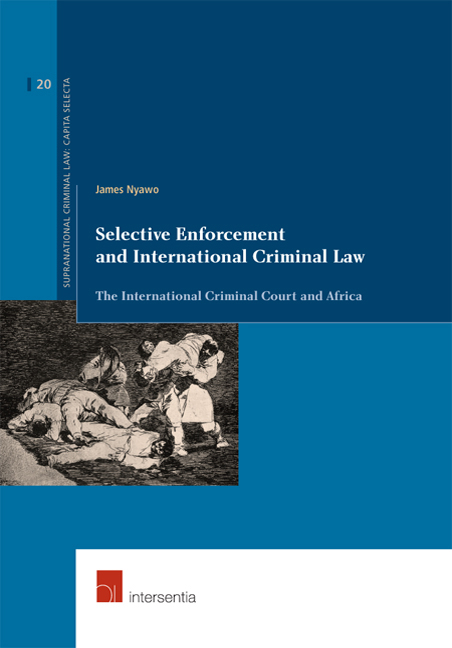Book contents
- Frontmatter
- Dedication
- Preface
- Acknowledgements
- Contents
- Epigraph
- Chapter 1 Introduction
- Chapter 2 The Establishment of the International Criminal Court, and Africa's Role and Early Support
- Chapter 3 The Office of the Prosecutor and the Politics of Selecting Targets for Prosecution
- Chapter 4 State Party Referrals, UN Security Council Referrals and the Selection of Situations
- Chapter 5 Assessing Selective Enforcement from an Admissibility Perspective
- Chapter 6 The AU and African States’ Shift from Cooperation to Non-Cooperation with the Court
- Chapter 7 African States’ Reaction to the AU's Call for Non-Cooperation with the Court
- Chapter 8 Africa and the International Criminal Court: The Lessons and Prospects
- Bibliography
- Index
Chapter 6 - The AU and African States’ Shift from Cooperation to Non-Cooperation with the Court
Published online by Cambridge University Press: 25 September 2018
- Frontmatter
- Dedication
- Preface
- Acknowledgements
- Contents
- Epigraph
- Chapter 1 Introduction
- Chapter 2 The Establishment of the International Criminal Court, and Africa's Role and Early Support
- Chapter 3 The Office of the Prosecutor and the Politics of Selecting Targets for Prosecution
- Chapter 4 State Party Referrals, UN Security Council Referrals and the Selection of Situations
- Chapter 5 Assessing Selective Enforcement from an Admissibility Perspective
- Chapter 6 The AU and African States’ Shift from Cooperation to Non-Cooperation with the Court
- Chapter 7 African States’ Reaction to the AU's Call for Non-Cooperation with the Court
- Chapter 8 Africa and the International Criminal Court: The Lessons and Prospects
- Bibliography
- Index
Summary
The AU and the Court have had a dynamic relationship. They were both inaugurated in 2002 and share the fundamental goal of fighting impunity for the perpetrators of war crimes, genocide and crimes against humanity. Despite these shared goals, the two institutions have a complex relationship. We have seen that members of the AU were initially among the key enthusiasts for the establishment of the Court. Their support extended beyond the establishment of the Court to its ratification and, as we will discuss later, some of the African states even resisted pressure from the US to sign bilateral agreements that would prevent them from extraditing US citizens to The Hague.
The AU's predecessor, the OAU, was actively involved in the negotiations leading up to the Rome Conference. It is reported that on 10 June 1998, during the 34th Assembly of Heads of State and Government of the OAU, meeting in Ouagadougou, Burkina Faso, adopted the Dakar Declaration on the International Criminal Court. This affirmed the commitment of the African states and NGOs to the establishment of the Court and underlined the importance of the establishment of the Court for Africa and the global community as a whole. Around 43 African states participated in the Rome Conference, with a few states such as Gambia, Somalia, Equatorial Guinea and Sao Tome absenting themselves.
The relationship between the AU and the Court appeared to have been cordial until the Prosecutor indicated that he was going to file an application for the arrest of the Sudanese President Omar al-Bashir in 2008. The relationship then deteriorated to such an extent that the negotiations for the signing of a cooperation agreement between the AU and the Court stalled, and the AU Assembly passed a resolution suspending any possibility of the Court opening a Liaison Office at the AU headquarters in Addis Ababa, Ethiopia. According to the Prosecutor's report to the UN Security Council, the Office of the Prosecutor had started negotiations for signing a relationship agreement with the AU in 2004 and continued after the referral of al-Bashir. The turning point in the relationship came when the AU Assembly adopted a resolution of noncooperation with the Court with regard to the arrest and surrender of first al-Bashir 694 and then President Gaddafi.
- Type
- Chapter
- Information
- Selective Enforcement and International Criminal LawThe International Criminal Court and Africa, pp. 187 - 220Publisher: IntersentiaPrint publication year: 2017



